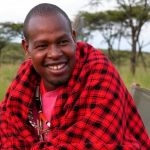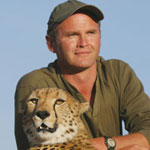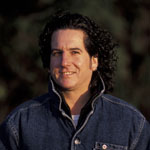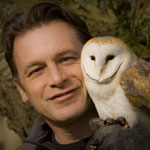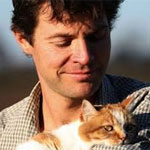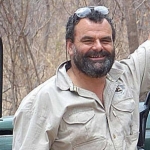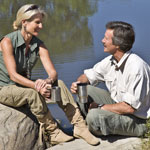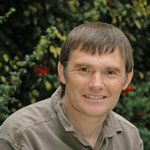2012 - Ethiopian Wolf Expedition with Prof. Claudio Sillero
An exclusive trail riding expedition in the remote Bale Central Peaks observing Ethiopian wolves with their pups
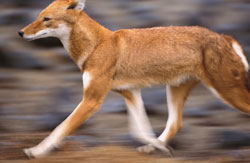 Ethiopian wolves are the rarest African carnivore, and the only wolf in Africa. Fewer than 400 wolves remain in a handful of mountain enclaves, and more than half are found in the Bale Mountains. The Bale Mountains are the ‘Roof of Africa’ – with a 1,000km2 of Afroalpine meadows and Erica moorlands this is indeed the largest mountain plateau in the continent. The wolves are the guardians of these magic lands, visited only by a handful of hard-core lupine enthusiasts and African travellers every year.
Ethiopian wolves are the rarest African carnivore, and the only wolf in Africa. Fewer than 400 wolves remain in a handful of mountain enclaves, and more than half are found in the Bale Mountains. The Bale Mountains are the ‘Roof of Africa’ – with a 1,000km2 of Afroalpine meadows and Erica moorlands this is indeed the largest mountain plateau in the continent. The wolves are the guardians of these magic lands, visited only by a handful of hard-core lupine enthusiasts and African travellers every year.
Check out the personal diary of our successful Living with Wolves trip that took place last February and also one from November
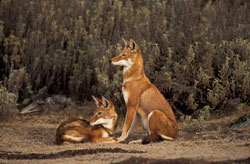 The Ethiopian Wolf Conservation Programme protects Ethiopian wolves and their Afroalpine habitats and was founded and is run by Prof. Claudio Sillero. It’s the only genuine trip and is hosted by leading wolf expert Prof. Claudio Sillero. This is unique opportunity to live with wolves and unlike other rare carnivores the wolves are easily found and observed. We will be able to see wolf packs from close up, and observe their foraging and social behaviour at a time when many packs will be looking after their pups.
The Ethiopian Wolf Conservation Programme protects Ethiopian wolves and their Afroalpine habitats and was founded and is run by Prof. Claudio Sillero. It’s the only genuine trip and is hosted by leading wolf expert Prof. Claudio Sillero. This is unique opportunity to live with wolves and unlike other rare carnivores the wolves are easily found and observed. We will be able to see wolf packs from close up, and observe their foraging and social behaviour at a time when many packs will be looking after their pups.
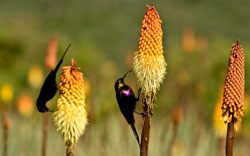 On this 8-day expedition to the hinterland of Bale, Prof. Claudio Sillero will share with you many of the secrets of these remote, wild mountains. You will travel on horse-back (no previous experience required) and on foot, through mountain valleys amid giant lobelias and get close and personal with the wolves. You will camp beside weird lava formations, watch raptors, and meet the Oromo pastoralists that make Bale their home. Whilst the camping will be to the highest standard available and as comfortable as practicably possible, this expedition requires a reasonable level of fitness and a spirit of adventure. You will be trekking on foot and horseback in remote mountainous areas up to 4,200m. Luxury accommodation awaits you pre and post your living with wolves’ experience.
On this 8-day expedition to the hinterland of Bale, Prof. Claudio Sillero will share with you many of the secrets of these remote, wild mountains. You will travel on horse-back (no previous experience required) and on foot, through mountain valleys amid giant lobelias and get close and personal with the wolves. You will camp beside weird lava formations, watch raptors, and meet the Oromo pastoralists that make Bale their home. Whilst the camping will be to the highest standard available and as comfortable as practicably possible, this expedition requires a reasonable level of fitness and a spirit of adventure. You will be trekking on foot and horseback in remote mountainous areas up to 4,200m. Luxury accommodation awaits you pre and post your living with wolves’ experience.
Become one of the few privileged travellers to live with Ethiopian wolves.
Prof. Claudio Sillero is the founder and Director of the Ethiopian Wolf Conservation Programme. His resolve and energy is the driving force behind the research and conservation of the Ethiopian wolf. He raises all the finance to sustain the project and actively spreads the awareness of the plight of the Ethiopian wolf. Claudio is also Head of Conservation at the Born Free Foundation and holds the post of Bill Travers Fellow for Wildlife Conservation at the University of Oxford. Claudio is the Chair of the IUCN Canid Specialist Group. He supervises other conservation projects worldwide, including the Satpura Landscape Tiger Programme in central India and the Transfrontier Conservation of Andean Cats project in South America. Claudio is a passionate conservation biologist actively committed to mitigating wildlife-human conflict through hands-on initiatives – the Ethiopian Wolf Conservation Programme is a prime example of this.
To learn more about Professor Claudio Sillero click here
For more info on The Ethiopian Wolf Conservation Programme:
www.ethiopianwolf.org
http://www.wildcru.org/research/research-detail/?project_id=41
http://wildlifeconservationnetwork.org/wildlife/ethiopianwolf.html
http://www.canids.org/wolfsg.htm
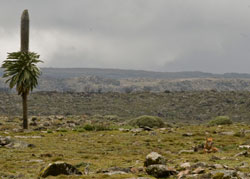 The Bale Mountains (2,500 – 4,377m)
The Bale Mountains (2,500 – 4,377m)
The scenery is spectacular, wild and varied with lava flows, dramatic granite outcrops, Afroalpine moorlands, Afro-montane forests, escarpments and high alpine plateau. The Bale Mountains are the largest mountain plateau in Africa (“the roof of Africa”) and home to the rarest African carnivore and the only wolf in Africa. Fewer than 400 wolves remain in a handful of mountain enclaves, and more than half are found in the Bale Mountains. The Bale Mountains are a vast wilderness area with no tracks and a pristine but fragile environment. Only a few Oromo families can be found living in isolation up on the plateau. The Bale Mountains are best visited during the dry season from November – February when the days are normally clear and warm and nights can be frosty. On the Sanetti Plateau sleet and snow is possible. Temperature will fall with increasing altitude and at night and could vary between +26C and –15C. At this time of year the Helichrysum, everlasting flowers of the Afroalpine area and the Hagenia and Hypericum trees are in flower, the wolves have their pups and so there will be lots of wolf social behaviour to observe around the dens.
List of Endemic Species in the Bale Mountains
| Mammals species include: | Endemic birds include: |
| Mountain Nyala Starck’s Hare Ethiopian wolf Bale monkey Giant Molerat Lovat’s mouse Nikolaus’ mouse Mahomet’s mouse White-footed rat White-tailed rat Grey-tailed rat Blick’s grass rat Shrews Bats |
Wattled ibis Blue-winged goose Rouget’s Rail Spot-breasted plover White-collared pigeon Yellow-fronted parrot Black-winged lovebirds Banded barbet Golden-backed woodpecker Abyssinian longclaw White-winged cliff-chat Abyssinian catbird White-backed black tit Black-headed forest oriole Thick-billed raven Black-headed siskin |
Camping & horse trekking in the Bale Mountains
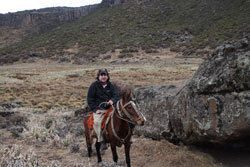 Previous riding experience is not necessary, as the riding is relatively easy (western-style) and will be taken at a slow walking pace with lots of rest stops. You may choose to walk and lead your horse for sections to give your legs a rest. The horses are selected for their calm nature and sure footing. Walking long distances at high altitude is not recommended unless you are extremely fit, so riding is preferable.
Previous riding experience is not necessary, as the riding is relatively easy (western-style) and will be taken at a slow walking pace with lots of rest stops. You may choose to walk and lead your horse for sections to give your legs a rest. The horses are selected for their calm nature and sure footing. Walking long distances at high altitude is not recommended unless you are extremely fit, so riding is preferable.
For maximum comfort and warmth we will provide a fully portered and catered mobile camp with individual expedition-grade tents from the UK for everyone (2-man Terra Nova Quasar), mess tent, bucket showers (cold water) and toilet tents from Ethiopia. You will need a 4-season sleeping bag, therma-rest or equivalent sleeping mat, inflatable pillow, towel, thermal underwear, walking shoes or trainers, Gortex waterproof and windproof jacket and over-trousers, and a down jacket. A full list of recommended gear will be provided prior to travel. All your personal equipment and camping gear is carried for you by packhorses or in the 4WD vehicles
Itinerary
| 5 November | Arrive independently in Addis Ababa or fly from London Heathrow (0700-2100 hours). Transfer to the Hilton Hotel. |
| 6 November | Breakfast in the hotel. Transfer to the airport for our private flight to Goba, where our 4×4 vehicles will meet us. From here it is approximately a 45 minute drive to EWCP base at the Bale Mountains National Park HQ in Dinsho (3,100m). Lunch with the EWCP team at their research centre. In the afternoon drive two hours to our camp in the Web Valley, which will have been pitched adjacent to the EWCP Sodota camp (3,450m). Settle in to camp before dinner is served in the hut. |
| 7 – 8 November | The Web Valley is home to several wolf packs and Sodota is an excellent base for wolf watching. The party will divide in to smaller groups of 3 – 5 people to facilitate close up encounters with the wolves and minimize disturbance. Groups will be led by Claudio and Alo; EWCP senior wolf monitor. We will explore the Web Valley looking for wolves on foot, horseback or from vehicles. After an early cup of tea and biscuits we will be heading straight out to search for wolves as dawn breaks. It’s back to camp for a hearty breakfast and perhaps a shower, before going back out for some more wolf monitoring. This is the time of year when some of the wolf packs will have pups and so we will be closely observing the behaviour at den sites. We’ll be out for most of the day taking a break with a picnic lunch. One day we’ll picnic at Fincha Habera waterfall, which has carved a deep cave under its ledge. Return to Sodota camp for dinner and early to bed. |
| 9 November | Dawn foray to observe wolves close to the camp. After breakfast the camp will be dismantled and everything except the shower will be taken, including your personal gear, by packhorses to the next camp at Keyrensa (3,800m), at the heart of the Bale Central Peaks. We’ll travel at a fairly leisurely pace predominantly on horseback but with the option to walk some of the time (approximately 21km – 6 hours). The Keyrensa Valley divides two lava flows where the views, isolation and wildlife are exceptional. As well as being the habitat of the Ethiopian wolf, this area is great to watch rock hyrax, klipspringer and many resident and migrant raptors including Augur buzzard, lanner falcon, kestrel, tawny, steppe, black and golden eagles. Lammergeier and Abyssinain long-eared owls also live here. The journey will be broken with wolf watching opportunities, rest stops and a picnic lunch. The camp will be pitched on arrival, the campfire lit and dinner served shortly afterwards. |
| 10 November | Set out at dawn to observe wolves close to the camp. After breakfast the camp will be dismantled again and all the gear will go by the packhorses to the next camp at Rafu (4,100m). We will continue on horseback (approximately 19 km – 7 hours), observing wolves along the way and taking plenty of rest stops as well as a picnic lunch break. The route to Rafu is through some of the most spectacular and dramatic scenery in the Bale Mountains and the campsite is tucked behind an impressive basalt wall. Leopards are sometimes heard in camp. The camp will be set up on arrival, the campfire lit and dinner served shortly afterwards. |
| 11 November | After breakfast the camp will be dismantled and taken to Central Lakes on the Sanetti Plateau(4,050m), where it will be pitched adjacent to the EWCP refuge hut. It’s approximately another 20km / 7 hours, with wolf watching opportunities, rest stops and a picnic lunch to Sanetti. On arrival in camp we’ll be reunited with our 4×4 vehicles and fresh supplies. Dinner will be served shortly afterwards in the hut. |
| 12 November | It is time to bid farewell to our riding horses, who will be heading back to Dinsho. Wolf watching on the Sanetti Plateau is either on foot or from the vehicles. After an early cup of tea and biscuits we will be heading straight out to search for wolves as dawn breaks. It’s back to camp for a hearty breakfast and perhaps a shower, before going back out for some more wolf monitoring. We’ll be out for most of the day. Lunch and dinner will be taken in camp. |
| 13 November | After a final dawn wolf watching foray and camp breakfast, it’s time to leave the Bale Mountains and say farewell to our camping crew and EWCP team. The first opportunity to freshen up at a hotel is a couple of hours drive away in Goba. Then we’ll go to the local airport where our private plane will be waiting to fly us back to Addis Ababa. Return to the Hilton Hotel. Farewell dinner in a local restaurant in Addis. |
| 14 November | Breakfast in the hotel. Full day at leisure to relax around the pool or to visit the National Museum of Ethiopia or the Asni Art Gallery. Transfer to the airport. If flying back to London depart Addis 2323 hours. |
| 15 November | Arrive London Heathrow 0810 hours. |
| Number of expedition guests : | 6 – 9 |
| Price per person : | £6,435 / US$10,300 |
| Single occupancy supplement (Hilton Hotel, Addis Ababa): | £145 / US$230 |
| London – Addis economy flights: | £700 / US$1,120 |
| London – Addis business flights: | £2,000 / US$3,200 |
Price includes:
Private plane Addis-Bale Mountains-Addis
4×4 vehicles (3 persons per vehicle)
2 nights Hilton Hotel, Addis Ababa
7 nights camping in individual expedition-grade tents
All meals except dinners on 5 & 14 November and lunch on 14 November
Fully catered & serviced camp.
Individual sleeping tents, mess tent, shared WC’s & bucket shower
Individual trekking horses, packhorses and grooms
National Park fees
Sustainable firewood
EWCP Director and senior wolf monitors
Spencer Scott Travel Director
Donation to the Ethiopian Wolf Conservation Programme
International flights
International flights can be arranged to suit individual preferences. If flying from London we recommend the Lufthansa flight via Frankfurt.
Flying from USA
We recommend departing the USA on 4 November and overnighting at a London Heathrow Airport hotel before flying to Ethiopia.
Fitness
The very nature of this expedition takes you out of your normal comfort zone because you are camping in a remote mountainous area away from civilisation. Whilst this is hugely rewarding and satisfying, it is mentally and physically challenging and requires a good level of fitness and general health. Walking long distances at high altitude is not recommended unless you are extremely fit, so riding is preferable. Any one unable to undertake the 3-day trail ride across the Bale Mountains, will spend more time observing wolves in the Sodota and Sanetti areas with a member of the EWCP team and the 4×4 vehicles and will spend two nights in a basic hotel in Goba.
Riding experience
Previous riding experience is not necessary, as the riding is relatively easy (western-style) and will be taken at a slow walking pace with lots of rest stops. You may choose to walk and lead your horse for sections to give your legs a rest. The horses are hardy Ethiopian mountain ponies selected for this trip for their calm nature and sure footing.
Camping equipment
For maximum comfort and warmth we will provide a fully portered and catered tented camp with individual expedition-grade tents (2-man Terra Nova Quasar), mess tent, bucket shower and pit toilets. You will need a 4-season sleeping bag, therma-rest or equivalent sleeping mat, inflatable pillow, towel, thermal underwear, walking shoes or trainers, down jacket, water and wind proof jacket and over-trousers. A full list of recommended gear will be provided prior to travel. All your personal equipment and camping gear is carried for you by packhorses or in the 4×4 vehicles.
Luggage allowance
The flights to and from the Bale Mountains will be on a small 9 or 12 seater aircraft. The weight restriction per person is 90kgs combined personal and baggage weight.
All images courtesy of A L Harrington & Prof. Claudio Sillero.
Ethiopian Wolf Expedition with Prof. Claudio Sillero
To make an enquiry please call orcomplete our contact form



